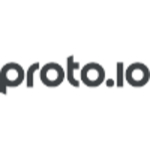TechnologyCounter provides genuine, unbiased real user reviews to help buyers make informed decisions. We may earn a referral fee when you purchase through our links, at no extra cost to you.
List of 15 Best Prototyping Software
Showing 1 - 15 of 18 productsMoqups, a powerful tool for visualizing your design ideas and creating interactive prototypes. With its versatile and user-friendly interface, Moqups allows you to easily collaborate with team members, streamline your workflow, and bring your visions...Read Moqups Reviews
As a leading design collaboration platform, InVision provides designers and teams with powerful tools to streamline their workflows and create seamless user experiences. With its intuitive interface, real-time collaboration features, is a project man...Read InVision Reviews
Proto.io is a powerful, user-friendly prototyping tool that allows you to bring your ideas to life. With its intuitive interface and wide range of features, Proto.io helps you create interactive and realistic prototypes for web and mobile application...Read Proto.io Reviews
Justinmind is a leading prototyping tool that allows designers and developers to bring their ideas to life. Its intuitive and user-friendly interface helps users create interactive and fully functional prototypes for web and mobile applications effor...Read Justinmind Reviews
Axure RP is a prototyping and wireframing tool used by designers, product managers, and developers to create interactive and functional prototypes with ease. With its intuitive interface and extensive library of elements, Axure RP allows users to bri...Read Axure RP Reviews
FlowMapp is a dynamic and innovative platform designed for visualizing and optimizing complex workflows. With its intuitive interface and powerful features, FlowMapp provides a seamless solution for teams and individuals to plan, collaborate and exec...Read FlowMapp Reviews
UXPin, the ultimate design tool for creating intuitive and user-friendly experiences. Our platform combines powerful design capabilities with collaborative features to streamline the process of designing and prototyping websites and apps. With UXPin,...Read UXPin Reviews
Pidoco the intuitive and innovative prototyping tool that brings your ideas to life. With Pidoco, creating interactive wireframes and prototypes becomes effortless, allowing you to turn your concepts into reality with ease. Say goodbye to long develo...Read Pidoco Reviews
Figma is a streamlined digital design tool that allows users to collaboratively create, edit, and share designs in real time. With its intuitive interface and powerful features, Figma revolutionizes the traditional design process and empowers teams t...Read Figma Reviews
MockFlow is a design and collaboration tool for creative teams. With a user-friendly interface and powerful features, MockFlow streamlines the entire design process from wireframing to prototyping. Say goodbye to endless emails and lost feedback, and...Read MockFlow Reviews
Balsamiq is a user-friendly wireframing and mockup tool that allows designers to quickly and effortlessly bring their ideas to life. With its intuitive interface and vast library of UI elements, Balsamiq is an essential tool for any design process, m...Read Balsamiq Reviews
Fluid UI is a tool that allows users to effortlessly design and prototype stunning interfaces for web and mobile applications. With its simple drag-and-drop interface and an extensive library of UI elements, Fluid UI makes the process of creating cap...Read Fluid UI Reviews
HotGloo is a and innovative web-based prototyping and mockup tool designed to streamline the entire design process. With its user-friendly interface is a collaboration features, HotGloo makes it easy for teams to create, share, and test prototypes in...Read HotGloo Reviews
Visily is a software solution for all your business needs. With its advanced features and user-friendly interface, Visily streamlines your workflow, boosts productivity, and ensures success for your organization. Say goodbye to complicated processes...Read Visily Reviews
Feast your eyes on Icons8 Lunacy is a design software tailored specifically for Windows users. With a user-friendly interface and a plethora of features, Lunacy offers a seamless experience for creating stunning graphics, editing images, and much mor...Read Icons8 Lunacy Reviews
- What Is Prototyping Software?
- Top Reasons Why Businesses Need Prototyping Software?
- What Are the Top Key Features of Prototyping Software?
- What Are the Top Benefits of Prototyping Software?
- What Are the Steps to Choose the Right Prototyping Software?
- What Are the Types of Prototyping Software for Different Industries?
- What Are the Technology Trends for Best Prototyping Software?
- What Are the Deployment Options for Prototyping Software?
What Is Prototyping Software?
Prototyping software refers to computer software utilized for the purpose of simulating an interactive user experience prior to the final completion of a product. This feature facilitates the acquisition of early input from consumers or stakeholders, hence enabling developers to implement improvements throughout the development process.
The input provided holds significant value as it offers developers valuable insights into potential difficulties or places for improvement prior to the completion of the product. Additionally, it aids in the reduction of development time, cost, and risk. The utilization of the best prototyping software can facilitate enhanced communication between developers and consumers.
By offering individuals the opportunity to engage with a preliminary iteration of the product, it becomes more feasible to comprehend the operational mechanics of the ultimate outcome. In this manner, stakeholders can gain a more comprehensive understanding of the anticipated functions, while developers can design a solution that aligns more effectively with the customer's requirements.
Collaborative technologies are furthermore accessible to enable inter-team communication within the context of project collaboration. In summary, the utilization of prototype software holds significant importance for development teams. The development of a preliminary iteration of the product facilitates the acquisition of input from users by developers.
Furthermore, best prototyping tools facilitates enhanced collaboration between developers and users. All of these aspects possess the potential to facilitate the development team in the creation of a superior product.
Top Reasons Why Businesses Need Prototyping Software?
The top fifteen reasons why businesses need prototyping software are as follows:
1. Rapid feedback – The utilization of the best prototyping software enables firms to efficiently and expeditiously obtain input from stakeholders, hence facilitating the process of making informed design decisions.
2. Cost-saving – The utilization of best prototyping tools can yield time and cost savings for enterprises through the optimization of the design process.
3. User experience – Prototyping tools facilitate the development of user-friendly and easily navigable products and services for enterprises.
4. Test and validation – The utilization of the best prototyping software allows firms to conduct testing and validation of their products prior to engaging in a comprehensive development process.
5. Design iteration – Prototyping tools give chances for rapid iteration of designs and modification of features in order to optimize the user experience.
6. Design accuracy – The utilization of prototyping enables firms to enhance the precision of design evaluation for their products and services.
7. Early bug detection – The utilization of online prototyping tools facilitates the early identification of faults during the design phase, hence mitigating the need for expensive rectifications in the latter stages of development.
8. Allows for design collaboration – Prototyping software offers a highly effective platform for facilitating design collaboration among various stakeholders, including product owners and developers.
9. Simulate user behavior – The best prototyping tools enables organizations to model customer behavior in relation to their goods and generate full user experience flows.
10. Project documentation – Prototyping technologies such as Zeplin facilitate the documentation of design elements by teams, hence enabling the establishment of a smooth workflow.
11. Usability testing – Prototyping software can be utilized by organizations to facilitate the execution of usability testing on a tangible device, so enabling them to promptly identify and rectify potential design deficiencies.
12. Multiple device prototyping – Organizations have the capability to develop prototypes that are compatible with many devices in order to guarantee optimal functionality of their products or services across all platforms.
13. Automated design processes – The best prototyping software can be employed by organizations as a means to enhance the efficiency of their design process through the utilization of automated activities and review cycles.
14. Flexible prototyping – Organizations have the ability to leverage online prototyping tools as a means to expeditiously generate and discard prototypes in order to accommodate their dynamic requirements.
15. Improved communication – The best prototyping software can be utilized by enterprises to enhance communication with team members and stakeholders.
What Are the Top Key Features of Prototyping Software?
1. Drag-and-Drop Interface: Prototyping software is commonly equipped with a user-friendly drag-and-drop interface, facilitating the rapid creation of interactive prototypes.
2. Nested Elements: In the realm of software prototyping, it is customary for the software to facilitate the inclusion of nested items within an interface. This functionality empowers the user to expedite the process of adding elements to the interface.
3. Dynamic Animations: Top prototyping tools commonly facilitates the creation of dynamic animations within prototypes, enabling users to animate their conceptualizations and imbue them with vitality.
4. Interactivity: The best prototyping tools provide customers with the capability to generate interactive prototypes. This entails the incorporation of interactive components like as buttons, gestures, and sets of motions.
5. Adaptive Design: The utilization of online prototyping tools facilitates the expeditious development of a flexible design that is compatible with many devices and web browsers.
6. Responsive Design: Prototyping software facilitates the seamless creation of a responsive design that can be flexibly adjusted to accommodate various devices and screen dimensions.
7. Pre-Built Components: Typically, prototyping software encompasses a repository of pre-existing components, enabling users to expeditiously generate a prototype starting from a blank canvas.
8. Real-Time Collaboration: Top prototyping tools frequently facilitate real-time collaboration, enabling concurrent engagement of numerous users in the development of a shared prototype.
9. Version Control: Online prototyping tools commonly offer users the capability of version control, which allows for the storage and management of many iterations of their designs.
10. Integrations: The best prototyping tools offer customers the capacity to seamlessly include their prototypes with various tools and services, including UI/UX design tools, project management systems, and additional resources.
What Are the Top Benefits of Prototyping Software?
1. Faster Time to Market: The utilization of prototyping software facilitates the expeditious development and evaluation of potential solutions, hence significantly diminishing the duration required to attain market readiness.
2. Reduced Development Costs: The utilization of prototyping software streamlines the development process, resulting in enhanced speed, cost-effectiveness, and efficiency.
3. Greater Efficiency: The utilization of top prototyping tools enables developers to visually represent and simulate the product prior to its physical construction, hence facilitating the identification of potential design flaws at an early stage.
4. Improved Collaboration: The utilization of online prototyping tools facilitates enhanced collaboration between developers and designers, hence fostering more coordination in the overall development endeavors.
5. Increased Visibility: The utilization of the best prototyping tools facilitates the dissemination of progress updates to stakeholders, so ensuring their awareness and enabling them to offer valuable feedback at the initial phases of the design process.
6. Improved Usability: The application of prototype software enables the systematic assessment of product design and functionality before its official launch, hence enhancing the development of high-quality products.
7. Enhanced Quality: The utilization of prototyping software facilitates the critical evaluation of product design and functioning prior to its official release, thereby contributing to the production of high-caliber products.
What Are the Steps to Choose the Right Prototyping Software?
1. Evaluate your needs: Initially, it is imperative to assess one's requirements with regards to the prototype software. One should carefully evaluate the desired features to be incorporated into the program, as well as the intricacy and structure of the tasks that are intended to be undertaken.
In addition, Top prototyping tools is important to take into account the specific platforms or devices that are being targeted for the prototyping process, including mobile devices, tablets, online platforms, and others.
2. Research different software platforms: After careful consideration of your requirements, it is advisable to conduct thorough research on the various software platforms now available on the market. Consulting customer reviews might aid in the identification of the most appropriate option for one's project.
A comparison website can serve as a valuable tool for researching and evaluating various software platforms. Inquire with fellow individuals regarding their personal encounters.
3. Finalise a software: Once the selection process has been refined to a single or a few of software solutions. It is advisable to do a comprehensive evaluation of the program and its functionalities in order to determine its compatibility with your requirements.
Conducting a comprehensive assessment of the functionalities and user experience is of utmost significance. Please assess the availability and quality of customer assistance, evaluate the pricing structure, and explore the various subscription choices, among other relevant factors.
4. Implement the software: Once the software selection process has been completed, the subsequent step involves initiating the prototyping phase of the project, thereby progressing towards its advancement.
It is imperative to possess a comprehensive understanding of the software's features and operations in order to effectively develop a design that is tailored to the needs of your consumers.
What Are the Types of Prototyping Software for Different Industries?
Prototyping software can be categorized into four different types of tools based on industries:
1) Web and Mobile Apps: Popular tools for rapidly building prototypes for online and mobile applications include InVision, Marvel, and Figma.
These software applications enable teams to efficiently create and showcase a digital product by utilizing pre-designed components that can be easily manipulated and placed through a drag-and-drop interface provided by an online library.
2) Desktop Applications: Axure RP and Balsamiq are widely utilized prototyping tools for the development of desktop applications. Using these technologies, teams have the ability to efficiently create prototypes through the utilization of a drag-and-drop functionality.
3) Augmented Reality (AR): The popularity of AR prototyping tools, such as Unity and Vuforia, is increasing alongside advancements in AR technology. These technologies enable designers to develop comprehensive interactive augmented reality prototypes.
4) Robots and IOT: Robotics and Internet of Things (IoT) prototyping technologies, such as Lego Mindstorms and Arduino, prove to be valuable assets for teams engaged in the design of robotic or IoT solutions. These technologies facilitate the rapid prototyping and testing of thoughts and design ideas by teams.
What Are the Technology Trends for Best Prototyping Software?
The technology trends for best prototyping software include:
1. Increased support for Cloud-based prototyping: Cloud-based prototyping tools, such as Figma, provide significant advantages, including seamless sharing, collaborative capabilities, and real-time updates, among others.
This facilitates the process for geographically dispersed teams to efficiently engage in collaborative idea generation, design, and experimentation in a synchronous manner.
2. Improved precision and accuracy of prototyping tools: Designers are afforded greater precision and a more detail-oriented user experience through the utilization of precise tools such as Sketch, Adobe XD, and Illustrator. Additionally, designers can utilize software tools like InVision to enhance static mockups by incorporating dynamic transitions and animations.
3. Increased focus on user feedback: Incorporating tools such as InVision into the design process helps enhance the efficiency and expediency of obtaining user feedback, hence streamlining the overall user experience.
4. Automation of the design process: Automation solutions, such as Zapier and UXPin, are facilitating the optimization of the design process, enabling designers to enhance their efficiency and generate outcomes of superior quality.
In general, the optimal top prototyping tools should encompass a blend of these attributes in order to adequately cater to the requirements of designers and product developers.
What Are the Deployment Options for Prototyping Software?
The deployment choices for prototyping software can exhibit variability, contingent upon the platform and the specific nature of the prototype under development.
In a general context, potential alternatives may encompass:
1. Manual Deployment: The process involves the manual transfer of files from a development environment to a deployment server or environment.
2. Virtual Machines: The execution of this process involves the utilization of a virtual machine installed on the development computer, wherein the software prototype is afterwards executed within the confines of the virtual environment.
3. Containers: The process involves the development of portable and self-contained software prototypes within container technologies, such as Docker.
4. Cloud: The software prototype can be deployed to cloud computing platforms, such as Amazon Web Services, Microsoft Azure, or Google Cloud Platform.
5. Automation: The deployment of the software prototype can be achieved through the utilization of automation technologies, such as Chef or Puppet.














